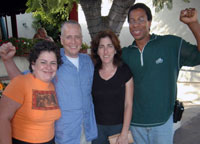‘Socialism & LGBT movement are linked’
By
B. Sandburg
San Francisco
Published Jul 21, 2005 8:54 PM
“There is nothing
intrinsic to socialism—a planned economy in a workers’
state—that lends itself to anti-gay bigotry or any other form of divisive
ideology,” well-known transgender lesbian activist Leslie Feinberg
stressed at West Coast public meetings July 15-18. “Capitalism, on the
other hand, is a dog-eat-dog economy that requires divide-and conquer
ideology.”
|
Ruth Vela, Leslie Feinberg,
Maggie Vascassenno and
John Parker in Los Angeles.
|
Feinberg, a managing editor of Workers World, spoke in
San Francisco, Los Angeles, San Diego and Las Vegas about her journalistic
series “Lavender and Red” which has run weekly over the last year in
WW newspaper. She stated, “It documents how the left wing of the
revolutionary movement, including leaders of workers’ states, have
supported the demand to end state repression against same-sex love for more than
a century.
“Where problems have existed in workers’
states,” she added, “they have been the result of too little
socialism—based on imperialist encirclement and lack of material
resources—not too much socialism. Yet let no one forget that they have
done what no rich capitalist country can do: provided free education and health
care, jobs, housing and food for all.”
Feinberg called for
movement-wide discussion groups to delve into a detailed discussion about
communism, an examination of history from a class-struggle vantage point and
commitment to confront red-baiting. That call was met in all four cities with
standing ovations.
San Francisco
A multinational audience of
some 200 people—including many youth—packed a hall at the San
Francisco Women’s Building on July 15, sitting in the aisles and pouring
into the hallway.
Feinberg refuted the idea that bigotry was a result of
human nature, pointing to the book “Living the Spirit,” an anthology
by Gay American Indians that documents alternative sex/gender roles in 135
Native nations in the Americas. What makes this fact of human history so
subversive, she emphasized, is that it shows that since society has not always
been the way it is now, it doesn’t have to be this way.
John
Parker, a leader of the West Coast International Action Center and of the
Million Worker March Movement in Los Angeles, spoke eloquently about the links
between struggles: the fight against the war in Iraq, the work of unions and the
Million Worker March Movement and the struggle for LGBT rights. He concluded
that “All these struggles are against a common enemy. All movements need
to stand together to fight oppression. They know we’ll fight back so they
try to put more fear in people’s hearts, to divide people. We can’t
let them do that.”
Judy Greenspan, who chaired the meeting, noted
that Workers World Party had supported an end to LGBT oppression even before the
modern U.S. movement raised the demand. “It’s not often you hear the
words lesbian, communist and transgender together,” she
said.
Nedjula Baguio, a transgender prisoners’ rights activist,
spoke about the abuse that trans people suffer behind prison walls, including
the denial of hormone treat ments. Trans and gender-variant indivi duals are
often unable to get higher education, employment, housing or access to
affordable health care. “When your every move and all your behavior is
continuously criminalized, you’re bound to end up in a negative situation
or prison,” Baguio said.
Rebecca Cooper—a fourth-generation
steel worker, union organizer and slam poet from Pitts burgh—wowed the
audience with her poem “Wal-Mart,” which pas sionately and
powerfully described the store’s purpose —“attack, demoralize,
destroy, create and exploit the working poor.”
Los Angeles:
‘Fight war,
racism and reaction!’
Feinberg and
Parker spoke together at a standing-room-only meeting the following day at the
LGBT Community Center. Almost half the audience Latin@, Black and
Asian.
Feinberg drew lessons for coalition building from Frederick
Douglass’ 19th-century fight for the abolition of slavery, against the
U.S. war on Mexico and for women’s rights. She added that the communist
leaders of the early 1950s Matta chine movement for homosexual emancipation also
reached out when they opposed the Korean War and spoke out publicly against
police brutality unleashed on the Chican@ community in Los Angeles.
Ruth
Vela—a leader of FIST (Fight Imperialism, Stand Together)—and Maggie
Vascassenno of the Los Angeles IAC co-chaired the meeting.
San
Diego
Ruth Vela and Feinberg addressed an activist audience that drew
Mexican@/Chican@, Black, Asian and white activists —lesbian, gay, bi,
heterosexual and trans.
Vela chaired the meeting and spoke on the San
Diego border struggle against the racist anti-immigrant vigilantes known as the
“Minutemen.”
Feinberg talked about how the “war on
terror” was aimed at any country that tried to defend its right to
self-determination and sovereignty abroad and also as a cover for repression
against immigrants and other oppressed groups in the U.S., as well.
Las Vegas
In Las Vegas, Feinberg and Workers World Party
leader Bob McCubbin spoke to an enthusiastic multi-national audience that
included an overlap of LGBT youth, anti-war and labor activists. The meeting,
called by the local Peace Now Coalition, was chaired by Las Vegas SEIU organizer
Pete Reilly.
McCubbin traced the ground-breaking work of Marxists that
has revealed the roots of lesbian, gay, bi and trans oppression in the
development of class-divided societies, large-scale private-property and the
repressive state—cops, courts, police and military.
Feinberg
concluded that ultimately, LGBT liberation can only be achieved by ending the
exploitation of human labor on a world scale.
Articles copyright 1995-2012 Workers World.
Verbatim copying and distribution of this entire article is permitted in any medium without royalty provided this notice is preserved.
Workers World, 55 W. 17 St., NY, NY 10011
Email:
[email protected]
Subscribe
[email protected]
Support independent news
DONATE


